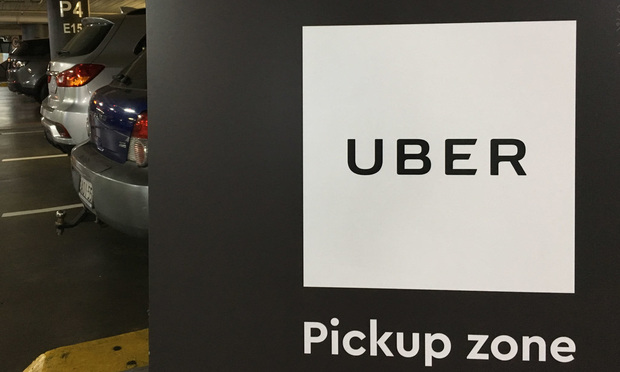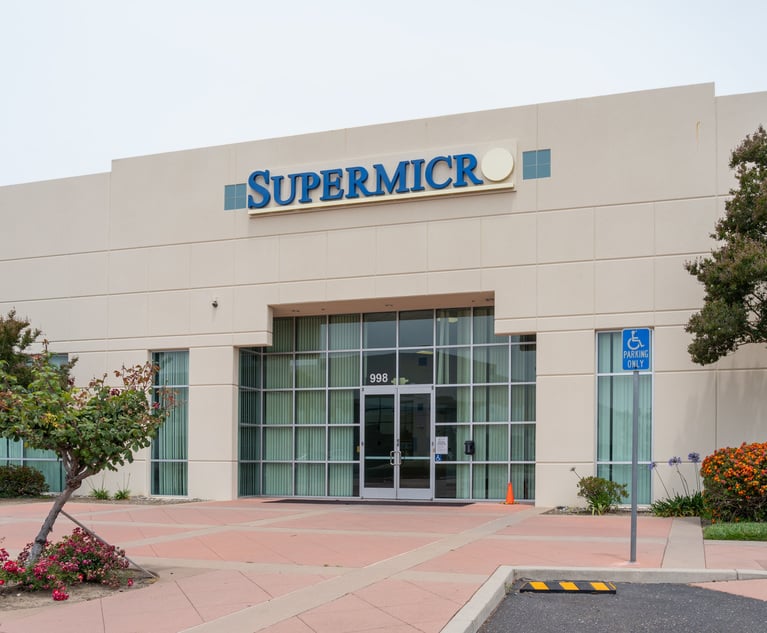After Extended Delay, Judge Approves $32.5M Settlement in Uber 'Safe Rides' Class Action
U.S. District Judge Jon Tigar, however, denied plaintiffs attorneys' requests for 25% of the settlement, or $8.125 million, finding that the settlement should be treated as a coupon settlement under Class Action Fairness Act.
August 14, 2019 at 03:04 PM
3 minute read

A federal judge in San Francisco has given final sign-off to a $32.5 million deal Uber Technologies reached with a class of passengers to settle claims related to its “safe rides” fees.
U.S. District Judge Jon Tigar of the Northern District of California gave preliminary approval to the settlement more than two years ago, but pumped the brakes on the deal last year while the U.S. Court of Appeals for the Ninth Circuit considered In re Hyundai and Kia Fuel Economy Litigation—a case concerning the viability of multistate class action settlements—en banc.
On Tuesday, with Hyundai resolved in a way that’s friendly to class action settlements, Tigar gave final approval to the Uber deal, which provides class members with $0.25 for the first safe rides fee they were charged and $0.05 for each subsequent charge—an average of about $1.07 per class member. As part of the deal, Uber has agreed to cease charging “Safe Rides Fees” and to refrain from using statements like “safest ride on the road” and “industry-leading” when describing company safety measures in advertising. Under the terms approved by Tigar, all unclaimed funds will go to the National Consumer Law Center.
In Tuesday’s order, however, Tigar declined to approved plaintiffs attorneys’ request for 25% of the settlement amount, or $8.125 million, finding that the settlement should be treated as a coupon settlement under the Class Action Fairness Act. Tigar wrote that Ninth Circuit law holds that attorney fees in such cases must be based on redemption rates for coupon portions of the settlement and based on the attorneys’ lodestar time for any non-coupon portion.
“Having concluded that this settlement should be governed by the principles applicable to coupon settlements under CAFA, the court orders plaintiffs to file an amended motion for attorney’s fees consistent with the above principles,” Tigar wrote.
A representative from Uber declined to comment Wednesday.
Tina Wolfson of Ahdoot & Wolfson and Mike Arias of Arias Sanguinetti Stahle & Torrijos, who represent the plaintiffs, didn’t immediately respond to messages.
The case was originally filed in 2014 claiming Uber misled consumers about conducting “industry-leading” background checks and failed to use the Safe Rides Fee to pay to provide more secure rides. Uber in 2016 settled related lawsuits brought by district attorney’s offices in San Francisco and Los Angeles over how it touted its safety practices.
This content has been archived. It is available through our partners, LexisNexis® and Bloomberg Law.
To view this content, please continue to their sites.
Not a Lexis Subscriber?
Subscribe Now
Not a Bloomberg Law Subscriber?
Subscribe Now
NOT FOR REPRINT
© 2025 ALM Global, LLC, All Rights Reserved. Request academic re-use from www.copyright.com. All other uses, submit a request to [email protected]. For more information visit Asset & Logo Licensing.
You Might Like
View All

'A Warning Shot to Board Rooms': DOJ Decision to Fight $14B Tech Merger May Be Bad Omen for Industry

California Walnut Grower and German Investment Firm Vie for Lead Plaintiff Status in Super Micro Securities Action

Apple Files Appeal to DC Circuit Aiming to Intervene in Google Search Monopoly Case
3 minute readTrending Stories
- 1Uber Files RICO Suit Against Plaintiff-Side Firms Alleging Fraudulent Injury Claims
- 2The Law Firm Disrupted: Scrutinizing the Elephant More Than the Mouse
- 3Inherent Diminished Value Damages Unavailable to 3rd-Party Claimants, Court Says
- 4Pa. Defense Firm Sued by Client Over Ex-Eagles Player's $43.5M Med Mal Win
- 5Losses Mount at Morris Manning, but Departing Ex-Chair Stays Bullish About His Old Firm's Future
Who Got The Work
J. Brugh Lower of Gibbons has entered an appearance for industrial equipment supplier Devco Corporation in a pending trademark infringement lawsuit. The suit, accusing the defendant of selling knock-off Graco products, was filed Dec. 18 in New Jersey District Court by Rivkin Radler on behalf of Graco Inc. and Graco Minnesota. The case, assigned to U.S. District Judge Zahid N. Quraishi, is 3:24-cv-11294, Graco Inc. et al v. Devco Corporation.
Who Got The Work
Rebecca Maller-Stein and Kent A. Yalowitz of Arnold & Porter Kaye Scholer have entered their appearances for Hanaco Venture Capital and its executives, Lior Prosor and David Frankel, in a pending securities lawsuit. The action, filed on Dec. 24 in New York Southern District Court by Zell, Aron & Co. on behalf of Goldeneye Advisors, accuses the defendants of negligently and fraudulently managing the plaintiff's $1 million investment. The case, assigned to U.S. District Judge Vernon S. Broderick, is 1:24-cv-09918, Goldeneye Advisors, LLC v. Hanaco Venture Capital, Ltd. et al.
Who Got The Work
Attorneys from A&O Shearman has stepped in as defense counsel for Toronto-Dominion Bank and other defendants in a pending securities class action. The suit, filed Dec. 11 in New York Southern District Court by Bleichmar Fonti & Auld, accuses the defendants of concealing the bank's 'pervasive' deficiencies in regards to its compliance with the Bank Secrecy Act and the quality of its anti-money laundering controls. The case, assigned to U.S. District Judge Arun Subramanian, is 1:24-cv-09445, Gonzalez v. The Toronto-Dominion Bank et al.
Who Got The Work
Crown Castle International, a Pennsylvania company providing shared communications infrastructure, has turned to Luke D. Wolf of Gordon Rees Scully Mansukhani to fend off a pending breach-of-contract lawsuit. The court action, filed Nov. 25 in Michigan Eastern District Court by Hooper Hathaway PC on behalf of The Town Residences LLC, accuses Crown Castle of failing to transfer approximately $30,000 in utility payments from T-Mobile in breach of a roof-top lease and assignment agreement. The case, assigned to U.S. District Judge Susan K. Declercq, is 2:24-cv-13131, The Town Residences LLC v. T-Mobile US, Inc. et al.
Who Got The Work
Wilfred P. Coronato and Daniel M. Schwartz of McCarter & English have stepped in as defense counsel to Electrolux Home Products Inc. in a pending product liability lawsuit. The court action, filed Nov. 26 in New York Eastern District Court by Poulos Lopiccolo PC and Nagel Rice LLP on behalf of David Stern, alleges that the defendant's refrigerators’ drawers and shelving repeatedly break and fall apart within months after purchase. The case, assigned to U.S. District Judge Joan M. Azrack, is 2:24-cv-08204, Stern v. Electrolux Home Products, Inc.
Featured Firms
Law Offices of Gary Martin Hays & Associates, P.C.
(470) 294-1674
Law Offices of Mark E. Salomone
(857) 444-6468
Smith & Hassler
(713) 739-1250






